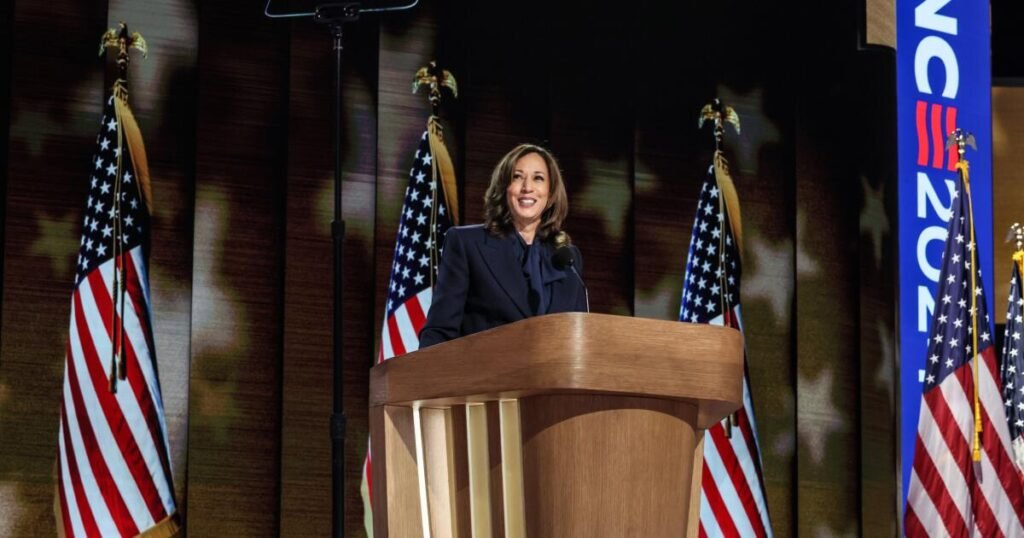Kamala Harris is one step away from becoming the first female president of the United States because she has always had the willingness and courage to take risks to seek higher office.
This is not a common trait among politicians: Too many at all levels choose to hold back and wait until “the right time” to run — and that time never comes.
Harris' philosophy: If there's an open window, no matter how narrow, jump in before it closes, and act before anyone else who might have the same idea.
Regardless of your view of Vice President Harris — whether you think she's qualified to lead the country or not — it's inarguable that she has boldly taken advantage of every opportunity to climb the political ladder.
That was true when the little-known prosecutor first ran for San Francisco district attorney against an establishment incumbent and won in 2003. It was true when she jumped in as an underdog and narrowly won the California attorney general election in 2010. And it was true when a Senate seat suddenly opened up in 2016, and she jumped in and won.
She didn't hesitate to run for president in 2020. It would have been a disaster. Or was it? She was nominated for vice president.
You can't move up without taking the next step. You can't win the race without running.
It's like citizens (very rare) who don't just complain about their government but actually try to do something about it – attending city council meetings to voice their opinions, supporting political candidates they favor, and even running for office.
In politics you need to be strong-willed because there are a lot of body blows, it's not for the faint-hearted or weak.
“She's known for being a cautious policy maker when she's in office,” said Darry Dragow, a longtime Democratic political strategist. “In contrast, when she has the opportunity to run for higher office, she's very bold. That willingness to go for it has served her well.”
Harris never backed away from a race because of the fear of losing, the effort required to win, or the prospect of future success.
“The political graveyard is full of people waiting,” said Ace Smith, chief strategist for Harris' successful campaigns for attorney general and U.S. Senate.
“Opportunities are hard to find. Those who are always waiting for opportunities will never be successful.”
A classic example is New York Governor Mario Cuomo, who was widely considered a front-runner for the Democratic presidential nomination in 1988 and 1992. He signaled he might be a presidential candidate but never ran, eventually losing his bid for reelection to a fourth term.
In 2010, then-Los Angeles County District Attorney Steve Cooley debated then-San Francisco District Attorney Kamala Harris in the California Attorney General election.
(Rich Pedroncelli/The Associated Press)
“I admire people who run away, who go into the unknown with no guarantees,” Smith says. “Sometimes you just don't know how things are going to break.”
For example, Ms. Harris was trailing in the attorney general race against the Republican front-runner, Steve Cooley, a three-term Los Angeles County district attorney. But in the only debate of the race, Times reporter Jack Leonard asked Cooley whether he planned to “double-dip” by taking both the district attorney's pension and the attorney general's salary, which is $425,000 a year.
“Yes, I am,” Cooley replied without hesitation. “I earned it.”
The Harris campaign used all of its scarce resources to run television ads portraying Cooley as a greedy politician gobbling down public funds, and the fact that Cooley was a Republican in a Democratic state also helped Harris' campaign. She narrowly won.
Harris was always early in announcing her candidacy, and far from being reserved, she was vocal about her decision.
“Basically, in politics, it's best to get a reaction from people,” Smith said. “Get in the race early, get support, raise money, build a big base. Other people who are thinking about running might miss that, which makes it even harder for them.”
When Sen. Barbara Boxer announced in January 2015 that she would not seek reelection the following year, Ms. Harris announced within days that she would run for the office.
Harris had hoped to run for governor when Gov. Jerry Brown's term ended in 2018, but a Senate seat opened up, and then-Lieutenant Governor Gavin Newsom called Harris to tell her he intended to run for governor.
It wasn't a backroom deal, argued Smith, who also served as Newsom's chief strategist: Both San Francisco natives decided for themselves which offices they would run for.
But the bold move into electioneering is a “double-edged sword,” Sragow said: “Candidates may enter elections that are not very favorable for them — they may not have enough money or an effective message.”
Harris' 2020 run for president was a textbook example. Her message was shaky and her performance was lacking. But she was smart enough to withdraw before the primaries took place, and avoided defeat in her own state. She was ultimately selected as Joe Biden's running mate.
Harris is already a history figure: The daughter of immigrant parents (a father from Jamaica and a mother from India), she is the first of her race and gender to hold multiple political offices, and may soon become the first woman to occupy the Oval Office.
“She's run as an underdog before and is used to being underestimated,” said Dan Morain, a former Times reporter who wrote a highly readable 2020 biography of Ms. Harris, “Kamala's Way: An American Life.”
“She runs harder and faster than her opponents. No one can outwork her.”
For now, I'm betting on Harris. Donald Trump is showing signs of wanting political death, and she'll take full advantage.
















